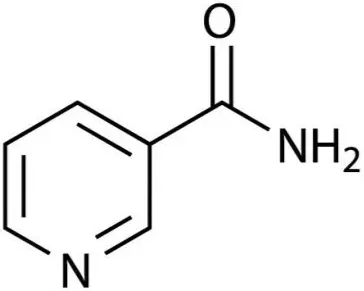How is Niacinamide Powder Different from Niacinamide Serum?
2025-03-05 09:59:12
Niacinamide, a powerful form of vitamin B3, has become a cornerstone ingredient in skincare and health supplements. As consumers increasingly seek targeted solutions for their skincare and nutritional needs, understanding the nuanced differences between Niacinamide bulk powder and its serum counterpart has become crucial. This comprehensive exploration will delve into the unique characteristics, applications, and considerations of Niacinamide in its various formulations.

What Makes Niacinamide Bulk Powder Unique in Skincare Formulations?
How Does Niacinamide Bulk Powder Differ from Traditional Skincare Ingredients?
Niacinamide bulk powder represents a concentrated and versatile form of vitamin B3 that has revolutionized the approach to skincare and supplement manufacturing. Unlike pre-formulated serums, this powdered form offers manufacturers and researchers unprecedented flexibility in product development. The powder's molecular stability allows for precise dosage control, enabling custom formulation strategies that can be tailored to specific skincare goals.
When working with Niacinamide bulk powder, formulators can experiment with various concentrations and combinations, creating innovative products that address multiple skin concerns simultaneously. The powder's pure, unadulterated nature means minimal additional ingredients, which can be particularly advantageous for individuals with sensitive skin or those seeking more natural skincare solutions.
What Manufacturing Advantages Does Niacinamide Bulk Powder Provide?
The manufacturing process of Niacinamide bulk powder presents significant advantages for cosmetic and pharmaceutical companies. Its high stability and long shelf life make it an ideal ingredient for large-scale production. Manufacturers can precisely control the concentration and purity of Niacinamide, ensuring consistent quality across different product batches.
Moreover, Niacinamide bulk powder offers remarkable versatility in product development. It can be easily incorporated into various formulations, including creams, lotions, serums, oral supplements, and even functional foods. This adaptability allows companies like Shaanxi Yuantai Biological Technology Co., Ltd. to create innovative products that meet diverse consumer needs.
How Can Researchers Leverage Niacinamide Bulk Powder for Advanced Skincare Solutions?
Research and development teams find Niacinamide bulk powder particularly valuable for conducting comprehensive studies on skin health and ingredient interactions. The powder's pure form enables precise scientific investigations into its potential benefits, ranging from skin barrier repair to pigmentation management.
By utilizing Niacinamide bulk powder, researchers can conduct controlled experiments, assess different concentration levels, and explore synergistic effects with other active ingredients. This approach facilitates the development of targeted skincare solutions that address specific dermatological concerns with unprecedented accuracy.

What Critical Differences Exist Between Niacinamide Powder and Serum Formulations?
How Does the Concentration of Niacinamide Vary Between Powder and Serum?
Niacinamide bulk powder typically offers higher concentration levels compared to pre-formulated serums. While commercial serums usually contain between 2% to 10% Niacinamide, bulk powder provides 100% pure active ingredient, allowing formulators complete control over the final product's potency.
This concentration flexibility means manufacturers can develop products targeting specific skin concerns with unprecedented precision. For instance, a serum designed for sensitive skin might utilize a lower Niacinamide percentage, while a treatment for hyperpigmentation could incorporate a higher concentration.
What Role Do Carrier Ingredients Play in Niacinamide Serum Formulations?
Niacinamide serums typically include various carrier ingredients and stabilizers that enhance product performance and user experience. These additional components help improve absorption, provide hydration, and ensure the active ingredient remains stable throughout the product's lifecycle.
Common carrier ingredients in Niacinamide serums include hyaluronic acid for hydration, glycerin for moisture retention, and botanical extracts that complement Niacinamide's skin-supporting properties. Each ingredient is carefully selected to optimize the serum's efficacy and sensory characteristics.
How Do Formulation Processes Differ Between Powder and Serum?
The formulation process for Niacinamide bulk powder and serums differs significantly in complexity and flexibility. Bulk powder offers a blank canvas for product development, allowing complete customization of the final formulation. Manufacturers can select precise carrier oils, emulsifiers, and complementary ingredients to create a tailored product.
Conversely, pre-formulated serums come with a predetermined composition, limiting modification possibilities. While convenient, these serums might not provide the same level of customization that Niacinamide bulk powder affords skincare innovators and researchers.

What Considerations Should Consumers and Professionals Evaluate When Choosing Between Niacinamide Powder and Serum?
What Factors Influence the Selection of Niacinamide Formulations?
Selecting between Niacinamide bulk powder and pre-formulated serums depends on multiple factors, including intended use, customization requirements, and specific skincare objectives. Professionals in the cosmetic and pharmaceutical industries often prefer bulk powder for its versatility and precise formulation potential.
Individual consumers might find pre-formulated serums more convenient, as they require no additional preparation and come ready to use. However, those seeking highly personalized skincare solutions or interested in creating custom blends may find Niacinamide bulk powder more appealing.
How Do Storage and Stability Differ Between Powder and Serum?
Niacinamide bulk powder demonstrates superior stability compared to pre-formulated serums. The powder's low moisture content and molecular structure ensure a longer shelf life and reduced risk of degradation. Proper storage in a cool, dry environment can maintain the powder's potency for extended periods.
Serums, while convenient, are more susceptible to environmental factors like temperature fluctuations and light exposure. Their liquid formulation requires more careful handling and typically has a shorter effective usage window once opened.
What Cost Considerations Exist for Niacinamide Powder and Serum?
From a cost perspective, Niacinamide bulk powder often proves more economical for large-scale manufacturers and researchers. The ability to create custom formulations without purchasing pre-made serums can significantly reduce production expenses.
For individual consumers, the initial investment in bulk powder might seem higher. However, the long-term cost-effectiveness becomes apparent when considering the powder's versatility and potential for creating multiple personalized skincare products.
Conclusion
Niacinamide powder and serum represent two distinct approaches to incorporating this powerful vitamin B3 derivative into skincare and health routines. While each formulation offers unique advantages, understanding their differences empowers consumers and professionals to make informed decisions tailored to specific needs.
Shaanxi Yuantai Biological Technology Co., Ltd. (YTBIO), founded in 2014, is a global health care company headquartered in Xi'an, with a manufacturing facility in Weinan. We specialize in health food ingredients, finished products, and functional cosmetic ingredients. In health foods, we offer products like Herbal Extracts, Magnesium Threonate, and Creatine Monohydrate, partnering with companies in Europe, America, and Southeast Asia. In cosmetics, we collaborate with Korean partners to provide ingredients such as Sponge Spicule, Retinol, Glutathione, and Arbutin, with a focus on natural products.
We have a branch and warehouse in Rotterdam for efficient EU delivery and are expanding into the U.S. with planned warehouses on both coasts. Quality is our top priority, and we hold certifications including HACCP, ISO9001, ISO22000, HALAL, KOSHER, FDA, EU&NOP Organic, and NMPA for cosmetics. We also support Korean clients with KFDA registration. We aim for long-term partnerships through high-quality products and professional service, striving to become a globally competitive company. In 2023, we participated in In-Cosmetics Korea and Supply Side West in Las Vegas.
For inquiries, contact us at sales@sxytorganic.com or +86-029-86478251 / +86-029-86119593.
References
1. Levin, J., & Momin, S. B. (2010). How Much Do We Really Know About Our Favorite Cosmeceutical Ingredients? The Journal of Clinical and Aesthetic Dermatology, 3(2), 22-41.
2. Gehring, W. (2004). Nicotinic Acid/Niacinamide and the Skin. Journal of Cosmetic Dermatology, 3(2), 88-97.
3. Draelos, Z. D. (2018). Cosmeceuticals. Elsevier Health Sciences.
4. Bissett, D. L., Oblong, J. E., & Berge, C. A. (2004). Niacinamide: A B Vitamin that Improves Aging Facial Skin Appearance. Dermatologic Surgery, 30(7), 1405-1410.
5. Pullar, J. M., Carr, A. C., & Vissers, M. C. M. (2017). The Roles of Vitamin C in Skin Health. Nutrients, 9(8), 866.
6. Navarrete-Solís, J., Castanedo-Cázares, J. P., Torres-Álvarez, B., Oros-Ovalle, C., Fuentes-Ahumada, C., González, F. J., & Martínez-Ramírez, J. D. (2011). A Double-Blinded, Randomized Clinical Trial of Niacinamide 4% versus Hydroquinone 4% in the Treatment of Melasma. Dermatology Research and Practice, 2011, 379173.
_1737093401309.png)
